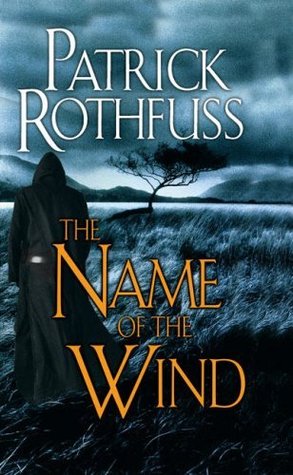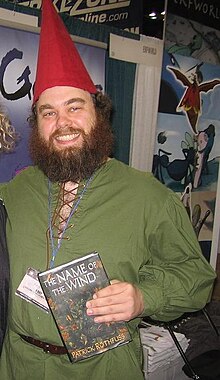The Plot: Kvothe The Kingkiller
The Name of the Wind by Patrick Rothfuss begins in a third-person narrative, telling how a famous scribe called The Chronicler comes to find the famous and infamous Kvothe, known as the Kingkiller, the Bloodless, and the Arcane. Except Kvothe is still a twenty-something year old man, living in a small town away from everything, running a tavern as a no-name, no-fame bartender. How did someone who is still so young become a living legend? Well, that's exactly what The Chronicler came to find out.
 |
| My favourite cover art version |
The rest of the book is Kvothe telling his life's story – the real story behind the legends that already surround his name. So most of the book is written in a first-person narrative and is not just a simple recounting of events: Kvothe adds in his musings, philosophies and opinions on matters and events as he tells of them. The series, called the Kingkiller Chronicles, is a trilogy where each book covers one day in which Kvothe recites to the Chronicler his life.
It starts with Kvothe as a young boy, living among a group of travelling minstrels. He travels the lands with them until he finds himself having to live on his own before he is even a teenager. He lives in a large city for a few years as a penniless beggar and pickpocket, then finds his way to the University to learn two things above all else: first, how to use magic, specifically to learn the name of the wind; second, he seeks knowledge of a particular sort (what the knowledge might be is kind of a big spoiler, so you'll just have to read to find out). Obtaining that knowledge is what largely drives Kvothe's life and how he manages it. It might take a back seat to lesser and more immediate issues at times, but he is always moving towards that ultimate goal.
The good thing is that this quest for knowledge leads him to investigate seemingly related matters whenever and wherever he comes across them, and this has him on several adventures that helps to grow his legend.
The Characters: Kvothe The Bloodless
 |
| My least favourite cover. |
Kvothe isn't one of those characters where trouble finds him. Kvothe seeks trouble, and half the time seems to deserve what he gets.
But that is also a defining characteristic of his: his life is hard. Legitimately hard. He suffers through a lot of incredibly difficult experiences, but forges through it all with a firm determination. That knowledge I said he seeks drives him in all that he does, oftentimes desperately and savagely. As the trilogy is a retelling of his life, there is some meandering in the book and doesn't always stay on one direct path to finding that goal, as parts are thrown in to continually develop him as a character.
And in that, Rothfuss does a fantastic job. There is real growth and development in Kvothe, in ways that you don't see as much or to such an extent in other books. It helps that the book is entirely dedicated to him and his development, but where other characters don't so much change as develop new abilities and powers, you can see Kvothe being affected by his experiences. His core personality might largely stay the same, but when Kvothe gets burned you can see him be wary around fire rather than just learning some magic to make himself immune to the flames.
While Kvothe does perform heroic acts in this book, and the series, and is by and large a good person, he is not perfect. He is flawed. He is cocky and arrogant, conceited and insecure, stubborn as a mule and reckless beyond reason at times. And all of these traits are exacerbated by the fact that he's very young, inexperienced in a lot of things, and lacking in wisdom. But for all of that he is undeniably brilliant, a voracious learner, witty and sly, brave in his own way, and a kind soul to the few friends and loved ones he manages to make.
But that is also a defining characteristic of his: his life is hard. Legitimately hard. He suffers through a lot of incredibly difficult experiences, but forges through it all with a firm determination. That knowledge I said he seeks drives him in all that he does, oftentimes desperately and savagely. As the trilogy is a retelling of his life, there is some meandering in the book and doesn't always stay on one direct path to finding that goal, as parts are thrown in to continually develop him as a character.
And in that, Rothfuss does a fantastic job. There is real growth and development in Kvothe, in ways that you don't see as much or to such an extent in other books. It helps that the book is entirely dedicated to him and his development, but where other characters don't so much change as develop new abilities and powers, you can see Kvothe being affected by his experiences. His core personality might largely stay the same, but when Kvothe gets burned you can see him be wary around fire rather than just learning some magic to make himself immune to the flames.
While Kvothe does perform heroic acts in this book, and the series, and is by and large a good person, he is not perfect. He is flawed. He is cocky and arrogant, conceited and insecure, stubborn as a mule and reckless beyond reason at times. And all of these traits are exacerbated by the fact that he's very young, inexperienced in a lot of things, and lacking in wisdom. But for all of that he is undeniably brilliant, a voracious learner, witty and sly, brave in his own way, and a kind soul to the few friends and loved ones he manages to make.
The Magic: Kvothe The Arcane
Speaking of magic, this series has a fantastic magic system and it comes in two parts.
 |
| A nice middle ground cover |
First, there is Sympathy. It involves a lot of calculations that sounds a lot like science and math at times, training your brain and your willpower, and exerting your mental capacity upon people and things. The more difficult the task you seek to achieve, the more willpower is required (unless you can craft Sympathy-imbued objects that can help ease the burden) and the more likely you are to kill yourself. You can use your own body heat to start a fire, but you directly reduce your own body temperature and if you go too far you will kill yourself. You can create or use objects much like voodoo dolls to inflict pain and sensations upon another person, or create a chain reaction that results in causing lightning to strike (under the right conditions).
Second, there is Naming. Everything in the natural world, including people and creatures, has names. To know a name, you must know and understand everything about the thing or living being. Once you know the name of a thing or a living being, you can manipulate if not directly control it. The Name of the Wind is the first young Kvothe is exposed to this magic, and it leaves a big impression on him. When he arrives at the University, it is not just to seek that important knowledge that largely drives his life's purpose, but to learn the name of the wind, such as he saw as a child.
The Writing: Rothfuss the Bardic Gnome
I call him a gnome only because of the picture below. I call him a bard because this series is all about story telling. It reads very much like a tale being told by a story teller, and not just because that's exactly what Kvothe is doing. Rothfuss' prose, the way he constructs dialogue, narrative, and descriptions just reads and feels like you're sitting by a fire while a bard recites an epic ballad.
 |
| Patrick Rothfuss: living gnome |
This book is also full of just great scenes and phrases. Some are absolutely hilarious, some are tear-jerkers, and some induce rage or pity or despair. Through clever word play, and masterful use of sentence construction, he is very adept at evoking strong emotions of all kinds in the reader (or at least in me).
I said about Brandon Sanderson's Way Of Kings that it was as close to perfect as I think a book could be, at least for my taste, and Name Of The Wind matches that success. I don't mean to say that it is perfect and without its flaws. None of the other characters have enough depth to them, and I don't mean compared to Kvothe who is the obvious focus of the series. Kvothe's love interest just seems so... flighty. In many ways, that seems to be how Rothfuss wanted her to be, but at times I think it was overdone and she becomes annoying. Too often Kvothe's interactions with her don't seem to really develop anything, and things just repeat rather than develop. The tension of "when/will they get together?" is obviously being drawn out, but I'd like some more development in their relationship.
However, since I can't reasonably expect perfection, I give this book a 10 out of 10 as a fantasy book. Like Way Of Kings this is a must-read for anyone who even mildly likes fantasy literature.
No comments:
Post a Comment